The Legitimate Intentions of Professor Mustafa Al-Zalmi in his Book The Philosophy of Sharia - An Applied Study -
محتوى المقالة الرئيسي
الملخص
ABSTRACT
The author (may Allah have mercy on him) extrapolated the legal Intentions in the total provisions of worship and transactions, which came in the book The Philosophy of Sharia.
The comprehensive view - theoretical and applied - in which the author, may Allah have mercy on him, distinguished in understanding the Intentions through his book (The Philosophy of Sharia), as he, may Allah have mercy on him, explained the legal meaning of the term philosophy, then said: What concerns us in this book is philosophy in its legal sense, which is about necessary interests, necessity and perfectionism, and Kemalism, which is called the Intentions for the legislator, which supports his approach in his book The Philosophy of Sharia, where we find him issuing his words with legal texts that clarify the Intentions of the topic he deals with under the title of the philosophy of marriage, for example, divorce or other topics that the Holy Qur’an or the Sunnah of the Prophet assured on its Intentions .
Or we find it states wisdom and says that the wisdom of that, or the purpose of that. It is known that the wisdom, the reason, or the purpose is the basic material for the Intentions of the Sharia. In order for the research not to deviate from its objectives, we will choose applied models from the book The Philosophy of Sharia, and these applied models will be developed by the author, may Allah have mercy on him, under the title Philosophy (Philosophy of Marriage, Divorce, or otherwise) to prove the meaning of philosophy according to the author, which is the meaning of the Intentions of the Lawgiver.
تفاصيل المقالة

هذا العمل مرخص بموجب Creative Commons Attribution 4.0 International License.
COLLEGE OF ISLAMIC SCIENCES, TIKRIT UNIVERSITY. THIS IS AN OPEN ACCESS ARTICLE UNDER THE CC BY LICENSE http://creativecommons.org/licenses/by/4.0/

